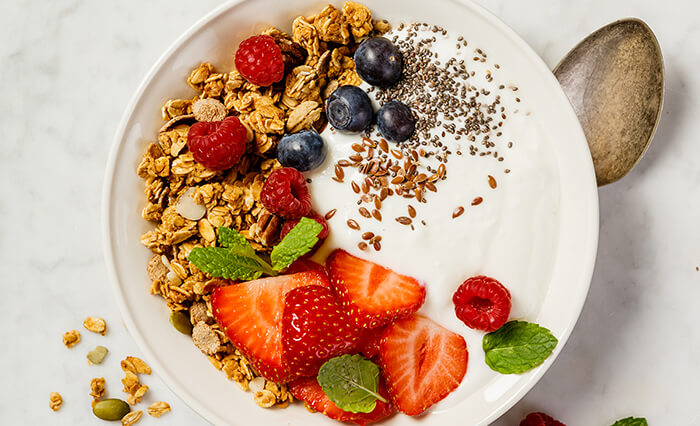By: Kristal Shelden, MPH, RDN

The gut microbiome is a topic of growing importance, and our understanding of it is changing rapidly. The microbiome refers to the unique collection of microorganisms or microbes (bacteria, viruses and fungi) that live in different parts of the body. Every person has trillions of microbes throughout the body, with most of them living in the intestines. When people talk about gut health, they’re typically referring to the number and variety of microbes living in the intestines. Gut health is affected throughout life by genetics, medications, the environment and nutrition. Research is continuing to uncover the many ways gut health is connected to immunity, brain health and possibly bone health.
The digestive system is connected to the body’s immune system. A healthy gut helps the body fight off viruses and infections and helps minimize inflammation throughout the body. Nutrition and health experts believe out-of-balance gut microbes can contribute to impaired immunity and increased risk of obesity, autoimmune diseases and other chronic diseases like type 2 diabetes.
Maintaining a healthy gut supports the immune system and overall health. Dairy foods like milk, yogurt and cheese are key food sources for establishing a healthy gut because they provide essential nutrients (including vitamins A and D, zinc and protein) and have a unique dairy matrix that contains nutrients, bioactive compounds and other biological components that work together to support digestion, absorption and immunity.
Health experts are exploring how the gut and brain communicate back and forth and positively or negatively affect each other, referred to as the “gut-brain axis.” Scientists believe microbes in the gut can impact mental health and that brain function can influence the types of bacteria living in the gut.
Emerging research is exploring how the gut microbiome affects bone health. It is thought that certain gut bacteria may help regulate components inside bones to weaken or strengthen bone mass, depending on the microbes present in the gut. Milk and dairy foods are especially important for people of all ages to consume regularly because the key nutrients in dairy foods interact with one another to support healthy bones and a healthy gut.
More research is needed to better understand how specific foods and combinations of foods interact with the gut and affect overall health and metabolism. While this research continues to evolve, people can take steps now to adopt habits that help support a healthy gut.
 #1: Eat fermented foods.
#1: Eat fermented foods.
Why this helps: Fermented foods like yogurt, kefir, some cheeses, kimchi, sauerkraut and tempeh are naturally rich in probiotics,
which have been shown to help maintain a healthy gut microbiome.
Food Tip: Make a smoothie with yogurt, kefir and frozen berries for breakfast or snack time.
 #2: Choose whole, minimally processed foods.
#2: Choose whole, minimally processed foods.
Why this helps: Many minimally processed foods like yogurt, whole grains, fruits, vegetables, beans, nuts and fatty fish are lower in sugar than highly processed foods and can reduce chronic inflammation in the gut and
throughout the body.
Food Tip: Add fruit and nuts to yogurt for a mid-morning or afternoon snack.
 #3: Eat a wide variety of foods from all food groups.
#3: Eat a wide variety of foods from all food groups.
Why this helps: A healthy gut has a wide variety of healthy bacteria. Eating a variety of foods from all food groups offers an assortment of nutrients that serve as food for different types of good bacteria and help build
a more diverse population of bacteria, which is good for the gut.
Food Tip: Combine at least two food groups when making a snack, like apple with cheese or milk with whole-grain cereal.
 #4: Choose high fiber foods.
#4: Choose high fiber foods.
Why this helps: Fiber is food for the good microbes in the gut and can help boost the diversity and total number of good bacteria. Beans, whole grains, fruits and vegetables are good sources of fiber, so include them
in your daily eating pattern.
Food Tip: Add beans and a variety of vegetables to soup, salad or rice.
 Tip #5: Be active.
Tip #5: Be active.
Why this helps: Research shows exercise may help increase the diversity of healthy bacteria in the gut. The Physical Activity Guidelines for Americans recommends adults aim for 30 minutes of activity at least five days per week, along with muscle strengthening activities two or more days per week. Combining exercise with eating a variety of nutrient-rich foods is a winning strategy for improving gut health and overall health.
Research is ongoing, and new information will help us better understand the relationship between a healthy gut microbiome and nutrition, immunity and overall health. Visit HealthyEating.org to learn more about how healthy eating patterns impact overall health and to find information on emerging research and trends.

Kristal Shelden, MPH, RDN
Kristal Shelden, MPH, RDN
Kristal Shelden is Dairy Council of CA’s advocacy manager, driving the organization’s thought leadership strategies and communications.
In this episode of Ask a Nutritionist, Maria Frye, RDN, answers the question, "How does a healthy gut support overall health?”

Whole foods eaten together provide health benefits beyond individual nutrients

Subscribe to our blog to stay up to date on the latest news, products, and more.